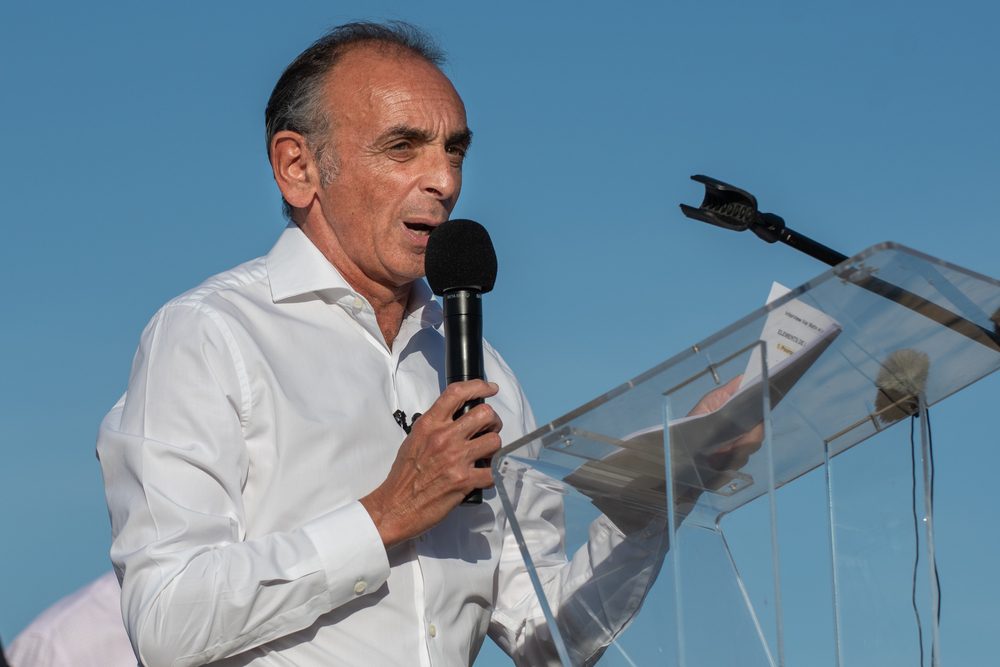
Éric Zemmour has made the Var department in Provence his home. He ran as a deputy there in the spring—without success—and he has just organised the summer university of his party, Reconquête, from Thursday, September 8th to Sunday the 11th.
In some areas of the Var, such as Saint-Tropez, Éric Zemmour got more than a third of the voters’ support this past June. The disappointment of the final score of the candidate was felt by his southern supporters, who now want to learn from his failure.
Their advice? “That he has more moderate advisers who prevent him from making the mistakes he made in his first campaign. He made some mistakes that were detrimental to him,” explains an activist to France Info, thinking in particular of his contested remarks on Ukrainian refugees. Another adds: “He must get away from his themes, security and immigration, and propose other things to the French.”
Confidence is still there, but expectations are high in terms of renewal and diversification of the discourse, at a time when the French are obsessed with inflation, purchasing power, and the energy crisis. It is a point of view shared by Marc-Etienne Lansade, departmental coordinator of Reconquête: “We must know how to adapt our discourse,” he said.
The young and dynamic party of the national Right, which claims 130,000 members, making it the largest party in France, is preparing to enter a more difficult phase of its existence. With no national election date in sight, it must keep the helm steady over the storm in the long term, and perpetuate its structures.
At the beginning of September, the party held an online congress to elect a new leadership team. The new statutes provide for the establishment of an executive bureau, a political bureau appointed on the proposal of the president, and a national council. The executive bureau is chaired by Éric Zemmour (elected for three years) and composed of five members: three vice presidents elected by the congress, and one to three additional members appointed by the president. The ex-candidate, therefore, controls most of the leadership functions, which is deplored by some members. If the vice presidents of Reconquête are indeed elected by the party members, they are, above all, chosen “on the proposal of the president.”
There was indeed a vote, but without competition. Not surprisingly, the three elected vice presidents are Guillaume Peltier, Marion Maréchal, and Nicolas Bay. As for the two additional members appointed by Éric Zemmour, they are Stanislas Rigault (president of the young activists’ movement Génération Z) and Sarah Knafo, Zemmour’s companion. “It’s a sham election,” deplores an executive in the columns of Le Figaro. “It prevents any political line from emerging and kills any possible competition.” Of the 130,000 members, only 21,255 members participated in the online vote.
Merci aux adhérents pour leur confiance et au travail ! pic.twitter.com/L7fYxyGByt
— Eric Zemmour (@ZemmourEric) September 9, 2022
Some personalities have already withdrawn, such as Gilbert Collard, whose position as honorary president is disappearing. Former RN MEP Jérôme Rivière is still in but has distanced himself and is no longer in charge of any function. Philippe de Villiers—who was some months ago eager to openly support Zemmour—is also off-screen now.
Even with such attrition of key members, enthusiasm was there for the summer university, which intends to whistle a new start for Reconquête. The festivities began with a training session for the executives, inaugurated by the vice president Marion Maréchal, taking up the motto of the prestigious military school of Saint-Cyr: ‘learn to win.’
Merci aux adhérents pour leur confiance et au travail ! pic.twitter.com/L7fYxyGByt
— Eric Zemmour (@ZemmourEric) September 9, 2022
The party reported 7,000 participants in the meeting held on Sunday, September 11th, in the small town of Vinon-sur-Verdon, which was broadcast live on the CNews channel.
Première intervention pour la formation des cadres de Reconquête par @MarionMarechal : « S’instruire pour vaincre. » #UDTreconquête pic.twitter.com/pgEUanfxAd
— RECONQUÊTE ! (@Reconquete_off) September 10, 2022
The themes dear to Reconquête were highlighted during the various speeches of the movement’s leaders, such as the promotion of the ‘defence of civilization,’ or the opposition to the government’s ‘security laxity.’ A few days after the start of the school year, Éric Zemmour chose to focus more specifically on education and the cultural battle. He announced the creation of parents’ groups intended to “look after” and “denounce” the deviances of the national education system observed in the schools, particularly in terms of LGBT propaganda—while the minister Pap Ndiaye has stated his desire to relaunch the fight against gender stereotypes from the age of three. The new slogan put forward by Reconquête’s communication is ‘protect our children.’ On the more classic theme of the fight against insecurity and immigration, Éric Zemmour proposed the use of the neologism ‘francocide,’ his spin on the Left’s neologism ‘feminicide,’ to designate the murder of a French person by an immigrant.
The summer university was also the occasion to reaffirm Reconquête’s alliance with other right-wing formations such as Via (formerly the Christian Democratic Party), the Mouvement Conservateur (Conservative Movement, born in the ranks of Les Républicains), and the CNIP, or National Centre of Independents and Peasants, a non-Gaullist conservative party born under the Fourth Republic.
